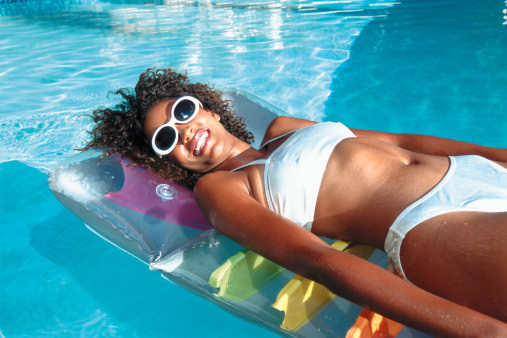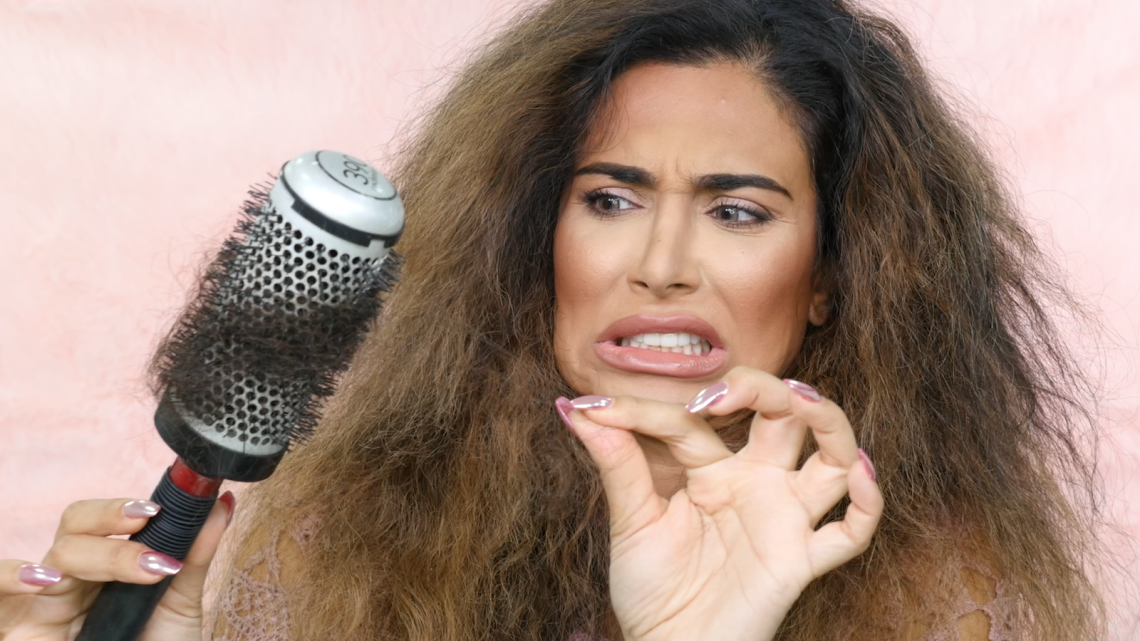Practical Tips On How You Can Have Water Safe Hair This Summer

Whether it’s summer camp for the kids, vacationing, jet skiing, hanging out at the pool, or dodging waves at the beach, you will probably be engaging in some sort of water activities to keep cool. While planning your summer activities, have you already planned your summer hair care regimen?
During the hotter months, everyone is busy taking advantage of the beautiful weather; planning more outdoor activities, swimming, and everything in between,without putting any fore thought into protecting their hair. My goal is to help you protect your hair from irreversible sun and water damage, while enjoying the season with family and friends.
It doesn’t matter if you’re swimming in chlorinated water or salt water, they both can have an adverse affect on your hair. Chlorine is a yellow-green gas used in water to protect the human body from harmful pathogens that cause diseases.
The amount of chlorine used will vary from pool to pool, with public pools having the highest content, due to the amount of people who might use the pool on any given day.
Many believe that wearing a swimming cap protects their hair from water, unfortunately, that’s untrue. A swimming cap will only protect your hair from the sun, if you’re swimming in an outdoor pool. Swimming caps were designed to keep hair out of your face, and from tangling in your goggles.
Swimming caps were designed to keep hair out of your face, and from tangling in your goggles. If your hair is overly exposed to chlorine (swimming multiple times per week) you may notice that your hair is dry and brittle because the chemical strips the hair of its natural oils*.
Your hair may also have a greenish cast on it from the oxidized metals (copper*) in the water. This happens when the copper* binds to the protein on your hair shaft and can only be corrected with proper treatment. If you only plan on taking an occasional dip in the pool, you won’t be exposed to as much chlorine, however, I still recommend taking proper precaution to protect your hair.
If your hair is fine, color treated, permed/relaxed or has pre-existing damage, and you are planning to frequent the pool, your hair has a greater risk of being compromised by chlorine.
 Before jumping in the water, unprotected, check out our top 6 tips to protecting your hair from chlorinated and salt water. These helpful tips will prevent you from spending fall, recovering from summer beaten hair.
Before jumping in the water, unprotected, check out our top 6 tips to protecting your hair from chlorinated and salt water. These helpful tips will prevent you from spending fall, recovering from summer beaten hair.
5 TIPS TO HEALTHY SUMMER HAIR
1. Coat your hair with conditioner – Always, Always wet, and coat your hair with a conditioner before entering into the water. The conditioner adds a protective layer on the hair, and wetting the hair before swimming minimizing the amount of chlorine or salt absorbed into the strand.
2. Wash your hair right after leaving the water – Never let your hair dry with chlorine or salt water in it. This makes your hair very dry and brittle, and it will eventually cause breakage if it’s done excessively.
After you’re done swimming, rinse your hair thoroughly to remove chlorine or salt from your hair. This will minimize damage to your hair. You can also rinse several times in between dips in the pool to help minimize absorption of chlorine in the hair.
3. Shampoo with a clarifying or chelating shampoo* – Always shampoo your hair with a shampoo that can remove chemicals such as chlorine followed by a moisturizing shampoo and conditioner. Look for swimming shampoos, chelating shampoos or clarifying shampoos and make sure to finish up by using a leave-in conditioner*.
4. Minimize heat use – If you’re planning to swim more than twice a week, cut down on the amount of heat used to style your hair, blow drying and flat ironing or curling only adds more stress to the hair. As an alternative, you can experiment with natural styles that don’t require heat.
5. Use products or oil with SPF – Always use products that contain sunscreen to protect your hair from the UV Rays. Make sure you read the label well to determine how much protection you are actually getting before making the purchase.
Bonus Hair Care Tip
Did you know that your hair is weakest when it’s wet? Whenever your hair is wet, the salt and hydrogen bonds are broken, which makes the hair easier to damage.
The “salt bond” is responsible for the elasticity (the ability for hair to stretch and return without breaking) and the strength of hair, while the “hydrogen bond” allows the hair to change shape with the aid of water (drying naturally, roller sets, twists, or bantu knots)
This is why having the right tools is imperative when styling your hair. Always remember to comb your hair from ends to scalp when detangling your hair; it prevents unnecessary shedding or breakage.
To ensure you minimize the damaging affects of chlorine on your hair, consult a hair care professional; they will prescribe the right products for your hair type and situation.




